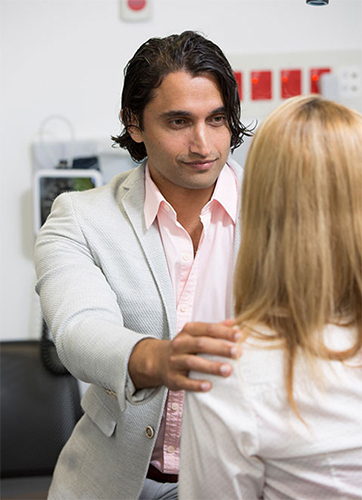Tips to reduce the risk of Breast Cancer

As the new year gets underway, many Australians are already planning for the year ahead and implementing the kinds of changes and goals they need to make to achieve better life outcomes.
Many of these involve losing weight, changing jobs, buying a new home, getting a raise and traveling. According to Associate Professor Sanjay Warrier, a leading breast cancer surgeon, with breast cancer now impacting one in seven women, reducing the risk of developing breast cancer should be top of many people's priority lists for the year.
"Health is much more important than anything else. If you don't have your health, you don't have much at all," Associate Professor Warrier said.
"Instead of focusing on activities that will cause you stress and angst, why not make this year about how to improve your breast health to reduce the risk of breast cancer."
Associate Professor Warrier is one of the world's leading breast health and breast cancer surgeons who has built a highly respected practice in Sydney. The practice spans three locations with its main surgical centre located at the Chris O'Brien Lifehouse in Camperdown, and the other sites at BMA House, Macquarie Street, Sydney and Bondi Junction Medical, Oxford Street, Bondi Junction.
In addition to Associate Professor Warrier's breast health and surgical work, he also dedicates considerable time to research exploring and developing advancements in breast cancer detection and treatments to improve outcomes for patients. He also codeveloped Australasia's first Master of Advanced Surgery (Breast Surgery) which is delivered through the University of Sydney.
"While genetics and other factors undeniably play a role in the likelihood of developing breast cancer, lifestyle choices also have a significant impact," Associate Professor Warrier said.
"By making proactive changes, you can work towards reducing the risk."
Top tips to include in your lifestyle choices to reduce the risk of developing breast cancer in 2025
Reduce your stress
"Stress is highly damaging to our health so it is important to reduce stress where possible to minimise its impact on your body's hormonal and immune systems. Chronic stress can elevate levels of cortisol, the body's primary stress hormone. Prolonged high cortisol levels may interfere with other hormonal processes, such as estrogen regulation. Since estrogen plays a key role in some types of breast cancer, maintaining hormonal balance is essential for breast health," Associate Professor Warrier said.
"Stress also weakens the immune system by reducing its ability to detect and destroy abnormal cells, including potential cancer cells. By managing stress, the immune system is better equipped to function optimally and protect the body.
"Look at ways to reduce stress through walking, yoga, relaxation and other methods. Ensure you allow time to do this. Build it into your diary and daily schedule and let friends and family know so you receive the support and encouragement you need to stay focused and on track."
Maintain a healthy weight
"Excess weight, particularly after menopause, is linked to a higher risk of breast cancer. After menopause, fat tissue becomes the primary source of estrogen in the body. Excess fat leads to higher estrogen levels, which can promote the growth of hormone-receptor-positive breast cancers," Associate Professor Warrier said.
"Put in place a plan to manage your weight and if you need to lose weight consider making lifestyle changes. If you need help make an appointment with your doctor. In addition to lifestyle changes, your GP may be able to assist with a medical weight loss treatment. Set some goals and actively work towards them."
Exercise regularly
"Exercise helps regulate hormones and reduce inflammation, both of which can lower cancer risk. By exercising each week, at least five times a week, you are helping your body to move and maintain a healthy weight," Associate Professor Warrier said.
"Gym memberships can be expensive so look for ways to incorporate more movement into your day through a range of other activities if needed. Find an exercise buddy, group or local club that you can join. Walk more where possible as it is an excellent form of low impact activity that provides great benefit."
Limited alcohol intake
"Explore other options such as mocktails, no and low alcoholic drinks and drink more water."
Avoid smoking
"Smoking is associated with a number of cancers, including breast cancer, particularly in premenopausal women. Quitting smoking is one of the best steps you can take for your overall health," Associate Professor Warrier said.
"In addition, avoid the risk of being a passive smoker. Research results show that the risk of cancer is elevated for people who inhale second hand smoke."
Learn how to undertake self examinations
"Every woman should undertake regular self examinations at home. I have developed a simple system called Look, Lift, Feel to help women undertake these checks in a comfortable and thorough way," Associate Professor Warrier said.
"More information about this system is contained on my website. It is important to become familiar with your breasts so that you are able to detect any changes when undertaking a self examination. If you do notice a change, contact your doctor or my clinic immediately."
Prioritise regular screenings
Embrace a nutrient-rich diet
"Focus on eating plenty of fruits, vegetables, whole grains and lean proteins. Incorporating foods rich in antioxidants and omega-3 fatty acids may also promote breast health," Associate Professor Warrier said.
"Eliminate fast food and highly processed foods from your diet where possible. Aim for fresh clean whole foods and avoid a lot of red meat. Nourishing your body with good food, vitamins and minerals helps your body to fight off disease."
Associate Professor Warrier emphasised that as we enter a new year, everyone should take small but meaningful steps toward improving their overall health, and for women, this should include breast health.
Further information about undertaking breast screening and detecting breast cancer can be found at https://www.drsanjaywarrier.com.au.
 About Associate Professor Sanjay Warrier
About Associate Professor Sanjay Warrier
Associate Professor Sanjay Warrier is a past President and current committee member of Breast Surgeons of Australia and New Zealand (BreastSurgANZ). His views are those of his own, not BreastSurgANZ. Associate Professor Warrier's surgery is located at the Chris O'Brien Lifehouse and he also has clinics at Oxford Street, Bondi Junction and Macquarie Street, Sydney. He is published in numerous peer-reviewed journals and won the Royal Prince Alfred Hospital's Patron's Prize for best scientific research.
MORE



